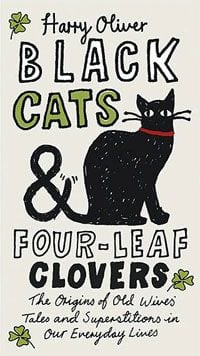
“God is great, beer is good, and people are crazy,” is the chorus from a song by Billy Currington.
I kept singing this little refrain to myself as I was reading Harry Oliver’s Black Cats and Four-Leaf Clovers: The Origins of Old Wives Tales and Superstitions in Our Everyday Lives. Particularly the part about people being crazy.
Oliver discusses everything from birthstones to wedding traditions to good luck charms in this book. Some superstitions will be familiar to many: the danger of walking under a ladder or breaking a mirror or the idea that cats have nine lives; other superstitions, such as potatoes being able to cure rheumatism or the benefits of hanging seaweed from a fireplace, may be less well-known. Whether familiar or not, almost all will make the reader pause, laugh, or tilt their head in amazed wonder/disbelief at the crazy things humans believe[d].
Consider, for example, the tradition of sin eaters, a custom that started in the Middle Ages:
It was believed that, if people ate food that had come into contact with or had at least been in close proximity to the corpse, the dead person’s sins would be transferred to them and the dead would reach heaven faster. Few people would obviously volunteer for such an activity as it would bring sins upon them, so it was therefore common practice to hire professional sin eaters, mostly chosen from the starving poor.
Sin, death, and the devil appear to be popular themes in the world of superstitions and old wives tales. Oliver relates that if a person cuts his or her nails on Sunday “the devil will be with [them] all the week”, that a baker’s dozen includes an extra loaf for the devil, that the reason breaking a mirror is bad luck is because it can expose the soul to the devil, and that a caterpillar can be a harbinger of death.
Of course, luck—both good and bad– is probably the most prominent theme. And the ends to which people will go to achieve good luck (or to avoid bad) bring us back to the “people are crazy” mantra. Take moles’ feet. Evidently a mole’s foot is lucky, so lucky that people used to wear moles’ feet around their necks. Scarily, that’s not the crazy part. The crazy part—to gain the most good luck “the feet should be removed while it [the mole] was still alive and that the creature should then be left to die in its own time.”
Thankfully, Oliver also relates some easier (although perhaps still slightly crazy) ways to have good luck or change your luck; these include crossing your fingers, throwing a shoe, throwing coins into a fountain, finding a ladybug, and wearing your underwear inside out.
Moles being left to bleed to death aside, Black Cats and Four-Leaf Clovers is a fun read. As many of the tales have a somewhat spooky nature and with Halloween being just around the corner, it is a timely book, as well.
Plus, if we can’t laugh at ourselves, who can we laugh at? With that thought in mind, here is perhaps my favorite entry from Black Cats and Four-Leaf Clovers:
A rasher of bacon is said to act as a remedy for various conditions, including constipation. It is also reputed to cure warts if rubbed on the affected area. Inexplicably, however, this will only be effective if the bacon is stolen.

![Call for Papers: All Things Reconsidered [MUSIC] May-August 2024](https://www.popmatters.com/wp-content/uploads/2024/04/all-things-reconsidered-call-music-may-2024-720x380.jpg)



